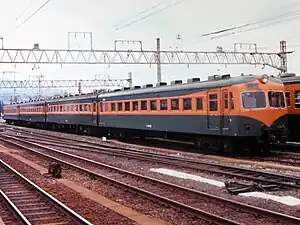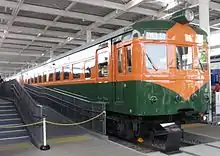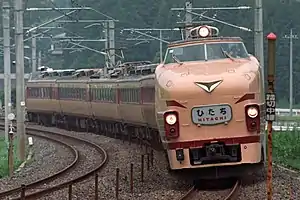80 series
The 80 series (80系, 80-kei) was an electric multiple unit (EMU) train type operated by Japanese National Railways (JNR) from 1950 until 1983.[1] A total of 652 vehicles were built.[2]
| 80 series | |
|---|---|
 A JNR 80-0 series train at Nakatsugawa Station on the Chūō Main Line in 1979 | |
| In service | 1950-1983 |
| Number built | 652 vehicles |
| Number preserved | 2 vehicles |
| Specifications | |
| Car body construction | Steel |
| Car length | 20 m (65 ft 7 in) |
| Electric system(s) | 1,500 V DC |
| Current collector(s) | Overhead catenary |
| Track gauge | 1,067 mm (3 ft 6 in) |
Variants
- 80-0 series
- 80-100/200 series: Trains introduced from 1956 with increased seat pitch and improvements for use in cold regions[1]
- 80-300 series: Trains with all-steel bodies[1]
 An all-steel-bodied 80-300 series unit in 1983
An all-steel-bodied 80-300 series unit in 1983![An all-steel-bodied 80-300 series unit in 1979 (Please note that some cars like this one are similar to the 72-970 series cars)[citation needed]](../I/80series85309.JPG.webp) An all-steel-bodied 80-300 series unit in 1979 (Please note that some cars like this one are similar to the 72-970 series cars)
An all-steel-bodied 80-300 series unit in 1979 (Please note that some cars like this one are similar to the 72-970 series cars)
Interior
 The Interior of preserved car MoHa 80001
The Interior of preserved car MoHa 80001
Preserved examples
Two first-batch 80 series cars, driving car KuHa 86001 and intermediate car MoHa 80001, are preserved on display at the Kyoto Railway Museum in Kyoto.[2]
 KuHa 86001 on display at the Kyoto Railway Museum in May 2016
KuHa 86001 on display at the Kyoto Railway Museum in May 2016
References
Wikimedia Commons has media related to JNR 80.
- 写真とイラストで見る国鉄急行型電車のすべて [JNR Express EMUs in pictures] (in Japanese). Japan: Neko Publishing Ltd. 29 November 2013. p. 10–21. ISBN 978-4-7770-1532-0.
- Sasada, Masahiro (25 November 2014). 国鉄&jr 保存車大全 2015-2016 国鉄&JR保存車大全2015-2016 [JNR & JR Preserved Rolling Stock Complete Guide 2015-2016] (in Japanese). Tokyo, Japan: Ikaros Publications Ltd. p. 38. ISBN 978-4863209282.
This article is issued from Wikipedia. The text is licensed under Creative Commons - Attribution - Sharealike. Additional terms may apply for the media files.
